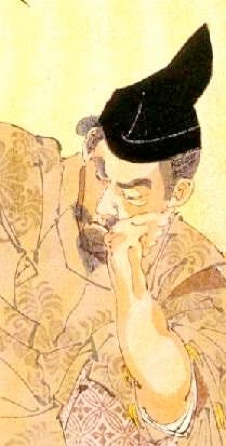Michinaga
Fujiwara Michinaga (966-1027) was the fifth son of Kane'ie, and the apotheosis of Fujiwara power and glory. De facto supreme ruler of Japan from 995 until his death, Michinaga was a veritable Lorenzo d'Medici, larger-than-life. His was the golden age of Japanese courtly culture, epitomized in the Fujiwara family chronicle A Tale of Flowering Fortunes, and also reflected in Murasaki Shikibu’s fictional Tale of Genji—although it is interesting that Murasaki gives her tale a historical setting several generations earlier, in an age when emperors still had authority. The emperor, by Michinaga's time, was completely subject to the will of the regent, the man who was also his father-in-law. There are several places in my novel that pick up historical incidents where Emperor Ichijō tried to resist Michinaga in one way or another, but was always foiled. Yet clearly Michinaga did not simply get his way by brute force. He was a consummate politician who knew how to manipulate everyone to his advantage.
Michinaga was father-in-law to three emperors, one retired emperor, and one crown prince. He was also grandfather of two emperors, and father of two regents. It was Michinaga who hired Murasaki as a lady-in-waiting in his daughter Shōshi's entourage, and clearly his reason for doing so was because Murasaki was the author of the phenomenally popular Tale of Genji.
Just what, exactly, was Michinaga's relationship to Murasaki? Certainly he was her patron in the sense that she owed her court position to him, but on a personal and emotional level, their relationship is much less clear.
Scholars fixate on those teasing exchanges of poems between them—the maidenflower Michinaga plucked and tossed into Murasaki's room, and the sourness of a plum not tasted. Were they lovers? We don't know. Did Michinaga sleep with most of the empress's ladies? Probably, yes. I have drawn my fictional conclusions based on what it seemed to me a man like Michinaga would want from a woman like Murasaki.
